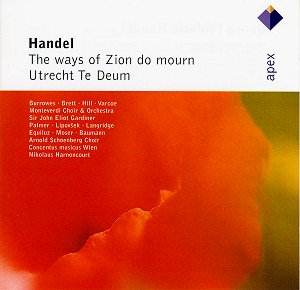When Queen Caroline
died, Handel lost one of his strongest
patrons. Wife of George II, she had
been an intelligent supporter of Handel’s
music since becoming Princess of Wales
when George I (her father-in-law) came
to the English throne. In fact, Handel
had composed music for her whilst he
was Kapellmeister in Hannover where
her father-in-law was Elector; in London
Handel was appointed music master to
her daughters.
The funeral anthem,
‘The Ways of Zion do Mourn’, was composed
for her funeral service in December
1737 and was performed, according to
an account in the Daily Advertisers,
by nearly eight vocal performers and
one hundred instrumentalists. Here it
is performed by the rather more modest
forces of the Monteverdi Choir and Orchestra
under John Eliot Gardiner.
An eloquent yet sober
work, the funeral anthem is around the
length of an act of an oratorio. It
is one of Handel’s finest works, yet
has somehow not really succeeded in
finding a regular place in the repertoire.
In many ways it is sui generis;
the only one of Handel’s religious occasional
pieces to have real depth and real coherence
of structure - it has few natural companion
pieces. Handel tried to re-use it (with
revised words) as the first act of ‘Israel
in Egypt’, but this does not seem to
have caught on even in Handel’s day.
Though, Eliot Gardiner did include the
piece (albeit with original words) in
his first recording of ‘Israel in Egypt’
he dropped this idea in his later recording
from the 1990’s. It is this original
recording from 1979/1980 which has been
re-issued here.
The work is substantially
a choral work and the Monteverdi Choir
give it a superb, well modulated performance.
They are well supported by Eliot Gardiner
and the Monteverdi Orchestra whose well
sprung rhythms provide a fine counterpoint
to the sober eloquence of the choir.
The recording wears its age well. Perhaps
nowadays conductors might be tended
to include a little more passionate
intensity, but Gardiner’s sober approach
to this noble piece works very well.
You would hardly buy
the funeral anthem for its soloists,
their contribution is relatively small.
But it was a pleasure to hear again
such singers as Norma Burrowes and Charles
Brett.
Handel’s ‘Te Deum’
and ‘Jubilate’, written to celebrate
the Treaty of Utrecht, were written
in 1713 just over a year after his arrival
in London. It is an effective and spirited
score, full of the brilliant touches
which Handel could bring to this sort
of occasional music.
The performance by
Nikolaus Harnoncourt and Concentus Musicus
Wien was recorded in 1984 and, like
the Funeral Anthem, it is wearing well
for its age. As ever, Concentus Musicus
provide a wonderfully crisp, strong
reading with some brilliant solos from
the wind and brass players. The Arnold
Schoenberg choir give a good strong
choral sound and their English is more
than creditable. It is welcome to hear
again in this music such soloists as
Felicity Palmer, Philip Langridge, Kurt
Equiluz and Thomas Moser; all make admirable
contributions. The only singer that
I had reservations about was Marjana
Lipovsek whose tone I found rather too
plummy for this music. On his Oiseau
Lyre recording with the Academy of Ancient
Music, which dates from 1980, Simon
Preston uses two soprano, a counter
tenor and two tenors. So that on the
Preston disc we have Emma Kirkby and
Judith Nelson duetting as two equals,
rather than Harnoncourt’s Felicity Palmer
and Marjana Lipovsek, duetting as soprano
and alto.
Comparison with the
Preston recording is illuminating. Both
come in at around the same total time
(Preston is 13 seconds faster over all)
but the overall feel of Preston’s version
is livelier and crisper. It is not a
light performance; Preston does duty
to the work’s massive origins, but he
manages to bring light into the music,
air between the notes. Whereas Harnoncourt
seems to be aiming for a more massive
effect; his performers still turn in
stylish, crisp performances but I did
not like the heavier feel of this recording.
To a certain extent this is a matter
of taste and the performance displays
some fine musicianship.
This pairing of two
of Handel’s occasional pieces provides
a very welcome opportunity to re-acquaint
ourselves with two recordings which,
once cutting edge, have now acquired
the patina of time.
Robert Hugill


